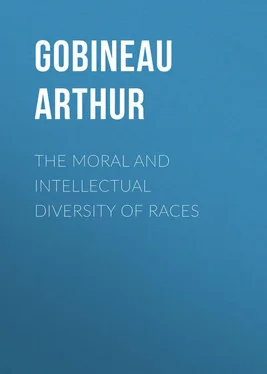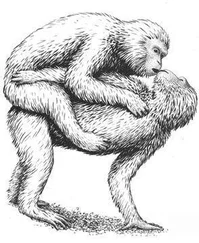Arthur Gobineau - The Moral and Intellectual Diversity of Races
Здесь есть возможность читать онлайн «Arthur Gobineau - The Moral and Intellectual Diversity of Races» — ознакомительный отрывок электронной книги совершенно бесплатно, а после прочтения отрывка купить полную версию. В некоторых случаях можно слушать аудио, скачать через торрент в формате fb2 и присутствует краткое содержание. Жанр: История, foreign_antique, foreign_prose, на английском языке. Описание произведения, (предисловие) а так же отзывы посетителей доступны на портале библиотеки ЛибКат.
- Название:The Moral and Intellectual Diversity of Races
- Автор:
- Жанр:
- Год:неизвестен
- ISBN:нет данных
- Рейтинг книги:4 / 5. Голосов: 1
-
Избранное:Добавить в избранное
- Отзывы:
-
Ваша оценка:
- 80
- 1
- 2
- 3
- 4
- 5
The Moral and Intellectual Diversity of Races: краткое содержание, описание и аннотация
Предлагаем к чтению аннотацию, описание, краткое содержание или предисловие (зависит от того, что написал сам автор книги «The Moral and Intellectual Diversity of Races»). Если вы не нашли необходимую информацию о книге — напишите в комментариях, мы постараемся отыскать её.
The Moral and Intellectual Diversity of Races — читать онлайн ознакомительный отрывок
Ниже представлен текст книги, разбитый по страницам. Система сохранения места последней прочитанной страницы, позволяет с удобством читать онлайн бесплатно книгу «The Moral and Intellectual Diversity of Races», без необходимости каждый раз заново искать на чём Вы остановились. Поставьте закладку, и сможете в любой момент перейти на страницу, на которой закончили чтение.
Интервал:
Закладка:
So far from being willing to accord to youthful communities any superiority in regard to morals, I have no doubt that, as nations advance in age and consequently approach their period of decay, they present to the eyes of the moralist a far more satisfactory spectacle. 37Manners become milder; men accommodate themselves more readily to one another; the means of subsistence become, if not easier, at least more varied; reciprocal obligations are better defined and understood; more refined theories of right and wrong gain ground. It would be difficult to show that at the time when the Greek arms conquered Darius, or when Greek liberty itself fled forever from the battle-field of Chæronæa, or when the Goths entered Rome as victors; that the Persian monarchy, Athens, or the imperial city, in those times of their downfall, contained a smaller proportion of honest and virtuous people than in the most glorious epochs of their national existence.
But we need not go so far back for illustrations. If any one were required to name the place where the spirit of our age displayed itself in the most complete contrast with the virtuous ages of the world (if such there were), he would most certainly point out Paris. Yet, many learned and pious persons have assured me, that nowhere, and in no epoch, could more practical virtue, solid piety, greater delicacy of conscience, be found than within the precincts of this great and corrupt city. The ideal of goodness is as exalted, the duties of a Christian as well understood, as by the most brilliant luminaries of the Church in the seventeenth century. I might add, that these virtues are divested of the bitterness and severity from which, in those times, they were not always exempt; and that they are more united with feelings of toleration and universal philanthropy. 38Thus we find, as if to counterbalance the fearful aberrations of our own epoch, in the principal theatre of these aberrations, contrasts more numerous and more striking, than probably blessed the sight of the faithful in preceding ages.
I cannot even perceive that great men are wanting in those periods of corruption and decay; on the contrary, these periods are often signalized by the appearance of men remarkable for energy of character and stern virtue. 39If we look at the catalogue of Roman emperors, we find a great number of them as exalted in merit as in rank; we meet with names like those of Trajan, Antoninus Pius, Septimius Severus, Alexander Severus, Jovian; and if we glance beneath the throne, we see a glorious constellation of great doctors of our faith, of martyrs, and apostles of the primitive church; not to consider the number of virtuous pagans. Active, firm, and valorous minds filled the camps and the forums, so that it may reasonably be doubted whether Rome, in the times of Cincinnatus, possessed so great a number of eminent men in every department of human activity. Many other examples might be alleged, to prove that senile and tottering communities, so far from being deficient in men of virtue, talent, and action, possess them probably in greater number than young and rising states; and that their general standard of morals is often higher.
Public morality, indeed, varies greatly at different periods of a nation's history. The history of the French nation, better than any other, illustrates this fact. Few will deny that the Gallo-Romans of the fifth and sixth centuries, though a subject race, were greatly superior in point of morals to their heroic conquerors. 40Individually taken, they were often not inferior to the latter in courage and military virtue. 41The intermixture of the two races, during the eighth, ninth, and tenth centuries, reduced the standard of morals among the whole nation to a disgraceful level. In the three succeeding centuries, the picture brightens again. Yet, this period of comparative light was succeeded by the dark scenes of the fourteenth and fifteenth centuries, when tyranny and debauchery ran riot over the land, and infected all classes of society, not excepting the clergy; when the nobles robbed their vassals, and the commonalty sold their country to a foreign foe. This period, so distinguished for the total absence of patriotism, and every honest sentiment, was emphatically one of decay; the state was shaken to its very foundation, and seemed ready to bury under its ruins so much shame and dishonor. But the crisis passed; foreign and intestine foes were vanquished; the machinery of government reconstructed on a firmer basis; the state of society improved. Notwithstanding its bloody follies, the sixteenth century dishonors less the annals of the nation than its predecessors, and it formed the transition period to the age of those pure and ever-brilliant lights, Fenelon, Bossuet, Montausier, and others. This period, again, was succeeded by the vices of the regency, and the horrors of the Revolution. Since that time, we have witnessed almost incredible fluctuations of public morality every decade of years.
I have sketched rapidly, and merely pointed out the most prominent changes. To do even this properly, much more to descend to details, would require greater space than the limits and designs of this work permit. But I think what I have said is sufficient to show that the corruption of public morals, though always a great, is often a transient evil, a malady which may be corrected or which corrects itself, and cannot, therefore, be the sole cause of national ruin, though it may hasten the catastrophe.
The corruption of public morals is nearly allied to another evil, which has been assigned as one of the causes of the downfall of empires. It is observed of Athens and Rome, that the glory of these two commonwealths faded about the same time that they abandoned their national creeds. These, however, are the only examples of such a coincidence that can be cited. The religion of Zoroaster was never more flourishing in the Persian empire, than at the time of its downfall. Tyre, Carthage, Judea, the Mexican and Peruvian empires expired at the moment when they embraced their altars with the greatest zeal and devotion. Nay, I do not believe that even at Athens and Rome, the ancient creed was abandoned until the day when it was replaced in every conscience, by the complete triumph of Christianity. I am firmly convinced that, politically speaking, irreligion never existed among any people, and that none ever abandoned the faith of their forefathers, except in exchange for another. In other words, there never was such a thing as a religious interregnum. The Gallic Teutates gave way to the Jupiter of the Romans; the worship of Jupiter, in its turn, was replaced by Christianity. It is true that, in Athens, not long before the time of Pericles, and in Rome, towards the age of the Scipios, it became the fashion among the higher classes, first to reason upon religious subjects, next to doubt them, and finally to disbelieve them altogether, and to pride themselves upon scepticism. But though there were many who joined in the sentiment of the ancient "freethinker" who dared the augurs to look at one another without laughing, yet this scepticism never gained ground among the mass of the people.
Aspasia at her evening parties, and Lelius among his intimates, might ridicule the religious dogmas of their country, and amuse themselves at the expense of those that believed them. But at both these epochs, the most brilliant in the history of Greece and Rome, it would have been highly dangerous to express such sentiments publicly. The imprudence of his mistress came near costing Pericles himself dearly, and the tears which he shed before the tribunal, were not in themselves sufficiently powerful to save the fair sceptic. The poets of the times, Aristophanes, Sophocles, and afterwards Æschylus, found it necessary, whatever were their private sentiments, to flatter the religious notions of the masses. The whole nation regarded Socrates as an impious innovator, and would have put to death Anaxagoras, but for the strenuous intercession of Pericles. Nor did the philosophical and sceptical theories penetrate the masses at a later period. Never, at any time, did they extend beyond the sphere of the elegant and refined. It may be objected that the opinion of the rest, the mechanics, traders, the rural population, the slaves, etc., was of little moment, as they had no influence in the policy of the state. If this were the case, why was it necessary, until the last expiring throb of Paganism, to preserve its temples and pay the hierophants? Why did men, the most eminent and enlightened, the most sceptical in their religious notions, not only don the sacerdotal robe, but even descend to the most repugnant offices of the popular worship? The daily reader of Lucretius 42had to snatch moments of leisure from the all-absorbing game of politics, to compose a treatise on haruspicy. I allude to the first Cæsar. 43And all his successors, down to Constantine, were compelled to unite the pontificial with the imperial dignity. Even Constantine himself, though as a Christian prince he had far better reasons for repugnance to such an office than any of his predecessors, was compelled to compromise with the still powerful ancient religion of the nation. 44This is a clear proof of the prevalence of the popular sentiment over the opinion of the higher and more enlightened classes. They might appeal to reason and common sense, against the absurdities of the masses, but the latter would not, could not, renounce one faith until they had adopted another, confirming the old truth, that in the affairs of this world, the positive ever takes precedent over the negative. The popular sentiment was so strong that, in the third century, it infected even the higher classes to some extent, and created among them a serious religious reaction, which did not entirely subside until after the final triumph of Christianity. The revolution of ideas which gradually diffused true religion among all classes, is highly interesting, and it may not be altogether irrelevant to my subject, to point out the principal causes which occasioned it.
Читать дальшеИнтервал:
Закладка:
Похожие книги на «The Moral and Intellectual Diversity of Races»
Представляем Вашему вниманию похожие книги на «The Moral and Intellectual Diversity of Races» списком для выбора. Мы отобрали схожую по названию и смыслу литературу в надежде предоставить читателям больше вариантов отыскать новые, интересные, ещё непрочитанные произведения.
Обсуждение, отзывы о книге «The Moral and Intellectual Diversity of Races» и просто собственные мнения читателей. Оставьте ваши комментарии, напишите, что Вы думаете о произведении, его смысле или главных героях. Укажите что конкретно понравилось, а что нет, и почему Вы так считаете.












